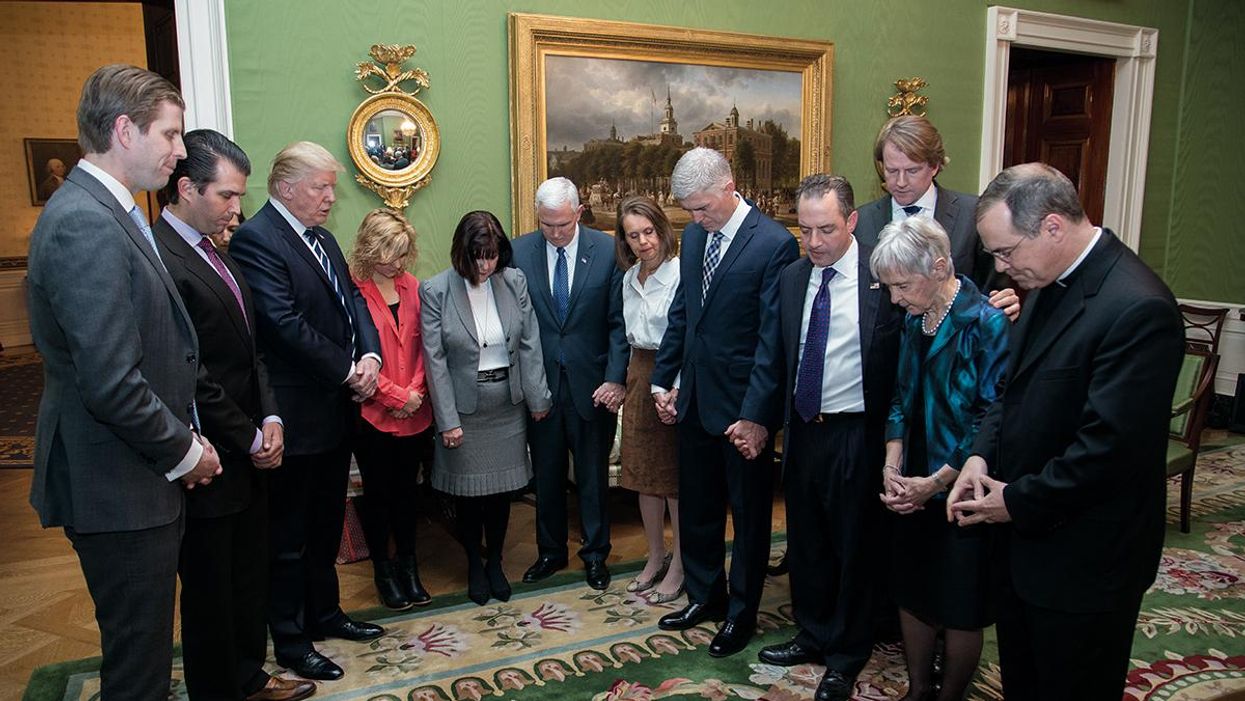How Donald Trump became the most powerful religious leader on the right

President Donald J. Trump and First Lady Melania Trump arrive at Joint Base Andrews Air Force Base Friday July 5, 2019, in Maryland, and depart on Air Force One en route New Jersey.
As Salon's Kathryn Joyce reported on Friday, Manhattan Institute senior fellow Christopher Rufo, who fashions himself "the new master strategist of the right," is not a man afraid of the spotlight. On the contrary, he's surprisingly candid for a man whose policy ambitions, such as destroying public education as we know it, are deeply unpopular. He loves to brag, on social media and into any microphone you'll put in front of him, of how he cynically concocts baseless moral panics with repeated false claims about everything from "critical race theory" to conspiracy theories about Disney "grooming" children for pedophilia.
But there's one thing that Rufo is surprisingly mum about: Religious faith.
Rufo's agenda is obviously being set by the religious right. He works closely with Hillsdale College, a fundamentalist school that functions as the Christian right's war room. His goals are aligned directly with long-term religious right targets. Searching his Twitter account, however, one swiftly finds that he never talks about his religious beliefs. There's no real mention of God or Jesus or the Bible. When he does speak about Christianity, it's only in the context of pushing conspiracy theories about how white Christians are victims of ethnic oppression by "woke" forces. His conspiracy theories are clearly designed to get Christian conservatives in particular riled up. For instance, he heavily hyped ridiculous claims that children are being taught to pray to Aztec gods in public schools — but he carefully avoids getting theological with it.
It wasn't always this way with the religious right. During the George W. Bush years, Republicans tended to wear their Bible on their sleeves. The God talk was frequent and explicit. Bush himself spoke of being "born again," and frequently did evangelical events thick with fundamentalist jargon that was impenetrable to outsiders. The public school fights weren't over "critical race theory" and false claims that kids were being taught sex acts in kindergarten. Instead, it was over whether schools should replace science with creationism and replace sex ed with abstinence-only texts that had been written by religious organizations. This public piety from Republicans was more muted during the Barack Obama administration, but only slightly. Throughout those years, the difference between a church service and a Republican fundraiser was often undetectable.
Then Donald Trump became president. On paper, Trump appeared to be as much of a supplicant to the relentless Jesus talk on the right as every other Republican. He hit up the same evangelical schools for speeches, waved Bibles around in public, and even did photo-ops where a bunch of grifty ministers prayed over him. But, as far as I can tell, almost no one was actually fooled by this. Trump's ignorance of Christianity was absolute. He wasn't even aware that the central tenet of his supposed faith was a focus on penance and forgiveness. He called Christians "fools" and "schmucks" behind their backs. But no matter how often Trump's evangelical base was reminded that he is not one of them, they stuck by his side. They believed, correctly, that he could deliver them the policy outcomes they desired: A rollback of reproductive and LGBTQ rights, the destruction of public education, and an end to the separation of church and state.
Turns out that Trump is the most powerful religious right leader of all, precisely because he so obviously isn't a believer. He created a "secular" cover that allowed the Christian right to hide in plain sight. Now he's out of office, but the lesson was learned well: The best way to impose theocracy on Americans is to dress it up as a secular movement.
Nowadays, the main public discourse on the right about Christianity is focused on identity, not theology. Fox News pundits like Tucker Carlson and Sean Hannity talk about Christianity mainly in demographic terms, as part of a larger conception of what it means to be a "real" American. It's less about what you believe, and more about what tribe you belong to. Across the country, Republicans are passing laws that are clearly designed to advance the Christian right agenda, from abortion bans to the "don't say gay" law in Florida. But the Jesus talk has taken a backseat to QAnon-inflected fantasies about pedophilia and litter boxes in schools.
That the QAnon-style conspiracy theories would work better than lots of public praying seems weird at first blush. But it works for one simple reason: The Christian right has terrible branding.
Church ladies waving crosses around are nobody's idea of a good time. A lot of Americans, even Republican-voting Americans, don't go to church very often, if at all. What Trump understood, and the GOP, in general, has glommed onto, is that people want to have fun or at least create the illusion of being fun people. Packaging misogyny and homophobia as religious faith may give it a moral justification, but it's also a drag. Putting those ideas into the mouth of someone like Joe Rogan or Carlson in his current "naughty boy" persona, however, makes it feel transgressive, cool, and exciting.
Trump gave the right permission to stop trying to dress up their ugly views in Christian piety. He pushed calorie-free bigotry. You get the pleasures of being a bully, but you don't have to pay the price of doing boring crap like going to church. Of course, it sells well.
The confirmation hearing of Amy Coney Barrett is a perfect illustration of this shift. Barrett has a long history of public piety in the Bush mold. It's why Trump chose her so that the religious right would feel absolutely secure that she will be the vote to overturn Roe v. Wade. But during her confirmation hearing, when Democrats tried to make hay over Barrett's lengthy record of super public religiosity, Republicans cried foul, pretending that Barrett's beliefs were an entirely private matter that had no impact on her jurisprudence. This bad faith was aided by the fact that Barrett happily stood by Trump's side in public, apparently indifferent to his long history of adultery and repeated divorce. That willingness to be in the same room with Trump, perversely, only helped bolster her image as a "reasonable" person who had no intention of forcing her fundamentalism on the American public. But, of course, that's exactly what she was hired to do.
Right now, the nation is being swept by a tidal wave of theocratic legislation, and the situation only looks like it's getting worse. So far, however, the public mostly doesn't seem to take much notice. The various abortion bans barely make a ripple in the public discourse and the threats to hard-won LGBTQ rights aren't really raising many alarms either. Part of that is due to Democratic complacency after President Joe Biden's 2020 win, of course. But part of it is that people respond, especially in our short-attention-span era, to aesthetics more than substance. The Christian right has stopped looking like the Christian right and instead embraced the secular-seeming vibe that Trump, because he's godless, embodies effortlessly. It's hard to convince the public that fundamentalists are coming for them when the fundamentalists have gotten so good at pretending to be someone else.

A member of the Florida Governor’s Faith and Community-Based Initiative was recently dismissed from his role as a deacon of Clearwater’s Calvary Church after it was revealed he had a history of sexual misconduct when he was a teacher.
Rev. Willy Rice told his congregation in a video that the deacon was stepping down over a past that involved “sexual sin that could also be described as abusive,” Religion News Service reports.
“It did not involve criminal charges, and he has never been identified by law as a sexual offender,” Rice also said.
“Religion News Service has confirmed that the former deacon is Jeff Ford, the executive director of Man Up and Go, a Christian nonprofit in the U.S. and overseas whose Authentic Masculinity Program ‘teaches men how to be protectors of and providers for their families,’ according to the biography of Ford posted on the website of Florida Governor Ron DeSantis. According to that website, Ford is a member of the state’s Faith-Based and Community-Based Advisory Council.”
In 2005, the Tampa Bay Times newspaper reported that Jeffrey Charles Ford, a 27-year-old coach and teacher at J.W. Mitchell High School, resigned after admitting to having sex with an 18-year-old student.
Ford’s bio on the Florida Governor’s website calls Man Up and Go “a global non-profit organization that inspires men to fight for the fatherless as Jesus commands. The organization aims to break the cycle of generational fatherlessness,” and operates “in Uganda, Ethiopia, and the Dominican Republic.”
DeSantis established the Governor’s Faith and Community-Based Initiative in 2019.

President Donald Trump joins Judge Neil M. Gorsuch, Louise Gorsuch, and others in prayer in the Green Room of the White House in Washington, D.C., following the President’s announcement of Judge Gorsuch as his nominee to the Supreme Court, Tuesday January 31, 2017.
During my time as a boy attending an evangelical church and then later, when I attended an evangelical seminary, it was hard not to notice an underlying misogyny that seemed consistently present. As a man, I would be the head of the household. I was like Christ to my future wife. In fact, I once heard a sermon by prominent evangelical minister Tony Evans where he declared that wives must refer to their husbands as "Lord." In my church youth groups, we were separated by sex and the boys had bizarre discussions on the type of men we should become. There was a strong emphasis on being what they considered to be manly and tough, whereas young girls, of course, were encouraged to be nurturing, submissive and, most important, sexually pure.
When contemporary evangelical leaders push a message around Christian nationalism, I can promise you it always refers back to a time when the "traditional" roles of American households held fast. Making America "great again" is truly about bringing back a time when women were subject to their husbands' wills and whims, and the husbands were lords of the house.
Someone recently wrote to me, in response to one of my previous articles, wondering why so many evangelicals chose Donald Trump, a vulgar misogynist who shows no understanding of any element of the Christian faith, over other candidates who were much closer to the evangelical movement. The difficult answer is that most evangelical men long for the days when misogyny was cool, when women were under the thumb of their husbands and sexual harassment was almost universally accepted. Trump exemplified that approach — and a great many evangelicals loved him for it. Trump remains the favorite of the evangelicals not because any commitment to Christ or the Christian way of life — since he has none — but because of the widespread desire among evangelicals to take back control over their lives, and their wives. One of the major ways this has been expressed lately is through the ideology known as Christian nationalism.
As I understand it, Christian nationalism is an idea now widely accepted within the evangelical church that the U.S. is a Christian nation founded upon Christian principles — no matter what it may say in the Constitution. This commitment to the Christian faith, as a nation, is the reason God blessed the U.S. as the greatest nation that ever existed. God will only continue to bless this nation, however, as long as it remains a Christian nation. As America becomes more progressive and increasingly secular in terms of politics, culture and faith, then in this view God will remove his blessing and protection and great evils will befall our nation.
This remarkable theory has no connection to any of the teachings of Jesus Christ or his followers, and is completely irrelevant to the Christian faith. I will certainly admit that I have a heart for American idealism. I have officiated at numerous Veterans Day and Memorial Day services, and I have felt the love of country enormously, on those days and all the days in between. None of that, however, has anything to do with Christianity. God does not play favorites when it comes to nations, people or cultures. That entire idea is morally and theologically absurd.
In truth, Christian nationalism is based not in the Bible or the teachings of Jesus Christ, but on the idea of the traditional American family. As roles for women have changed, as divorce becomes more common, as same-sex marriage gains a firmer footing, and now with the movement for transgender rights and visibility becoming more public, the panic of the Christian nationalists becomes ever more desperate. This is where all that rage among evangelicals is coming from. Understand, most people are motivated politically based on how they perceive policy decisions affecting their day-to-day life. Nothing affects our lives more than what is happening to our families. When things fall apart at home, it can feel helpful — even if it's not healthy — to blame someone or something besides ourselves. For myself, I know that all my personal failures are mine alone. I can't blame MTV or Eminem or the LGBTQI population, the evangelical church, Trump, Biden, Obama, my mom, my dad or anyone else. The problem is in the mirror, as it is for everyone. Any effort to pass that blame along to others is quite human, and quite wrong.
My final point on Christian nationalism is around all the macho tough-guy stuff that seems to be on the lips of every right-wing leader. Being "tough" seems to be the only thing conservative commentators and evangelical leaders care about. Trump is supposedly the epitome of that and his little posse loves him for it. I won't pretend to understand it. After I graduated middle school, being tough just didn't seem that important. But for people like Sean Hannity, Tucker Carlson, Jerry Falwell Jr. (before his fall) and of course Trump himself, it's important to keep pretending that they are a bunch of tough guys, even though they also claim to stand with Jesus Christ, a humble, meek and homeless teacher.
I'm no tough guy but I am happy to offer a challenge to any of these fake tough guys. Debate me anywhere, anytime. I am truly blue-collar, a member of the American working class. I am a Bible-believing minister and a flaming liberal. I believe that the Christian nationalist message comes from the devil himself. I am trying to save the name of the Christian faith and to stand up for American idealism. I oppose every part of the hypocritical, fake-populist agenda of the Christian nationalists and their enablers. I double-dog dare any of them, here and now, to stand up and take me on in public debate. Odds are they never will.
That 'freedom convoy' in Ottawa? It's inspired by an Old Testament account of divine massacre

Image via Wikimedia Commons
Thomas Lecaque
AlterNet
You might forget, however, what comes next.
From Joshua 6:20-21:
When the trumpets sounded, the army shouted, and at the sound of the trumpet, when the men gave a loud shout, the wall collapsed; so everyone charged straight in, and they took the city. They devoted the city to the Lord and destroyed with the sword every living thing in it—men and women, young and old, cattle, sheep and donkeys.
Jericho Marches are organized by a group by the same name. They were created by a coalition of Christian nationalists in the US. They are co-led by a Catholic think-tank writer (Arina Grossu of the Family Research Council) and an evangelical businessman (Rob Weaver).
The Jericho Marches rose to prominence recently. Supporters have been marching around the Canadian Parliament in Ottawa for around 20 days. They are, for Americans, a gothic reminder of what had been brewing in the lead up to the J6 sacking and looting of the US Capitol.
The same toxic brew
Jericho March, the group, is one of the religious groups, movements and ideologies that were at play in the insurrection. The Uncivil Religion project has uncovered a bevy of beliefs. The Jericho Marches, however, were the principal symbol of J6 and the Christian nationalism at its heart, not only in DC but at state capitols around the country.
Christian nationalism is a religious idea that transcends borders. It attracts a lot of support from like-minded insurrectionists abroad.
Last year, when journalist Emma Green wrote “A Christian Insurrection” for The Atlantic, it was subtitled it, “Many of those who mobbed the Capitol on Wednesday claimed to be enacting God’s will.”
The CBC Investigates piece on the Ottawa convoy this week is titled, “For many inside the Freedom Convoy, faith fuels the resistance.”
The links are very clear between groupings. And now, organizing in small groups and marching around Parliament, is a new Jericho March.
Spiritual warfare
Filmed versions of Jericho Marches reveal a large group in the snow, bearing primarily Canadian flags and singing hymns, reciting the Lord’s Prayer, and then blowing shofars before they began marching.
The hymns and prayers were occasionally punctuated by people yelling “Freedom!” and trucks honking. One woman spoke in tongues before engaging in rhetoric I’ve seen in spiritual warfare sermons.
They prayed for healing from vaccines and for summoning the “Lord of Heaven’s armies.” As the National Review reported, the Jericho March goes every day, once around Parliament, and seven full laps on Thursdays, carrying horns and trumpets. And they hope eventually more will show up, to the tune of thousands and thousands.
Benita Pedersen, an organizer from Alberta, was interviewed by a sympathetic Christian YouTube channel about what they are doing.
Pedersen said she felt a “call on her heart” to do this. She had been given a steer horn by a local farmer. She knew she had to bring it to Ottawa and to do a Jericho March. She’s using that as a shofar.
She said that the “freedom movement” was “100 percent hand in hand with Jesus.” They go together beautifully, she said, and nonbelieving supporters should think about Jesus and about how it goes together.
Divine massacre
But, of course, this isn’t her first time.
She led an anti-vaxx rally outside of the Royal Alexandra Hospital in Edmonton in September, received 10 Public Health Act tickets for organizing various anti-public health rallies in northern Alberta last year and revived her Twitter account, dormant since 2016, specifically in order to promote anti-public health events she organized and ran.
The story of Jericho is nothing to worry about.
It’s only about divine massacre.
Walls come crumbling down
They know what they are doing. One participant on TikTok recounted the biblical story before backpedaling that this was “not about crumbling walls or infrastructure,” but about softening hearts.
Previous Jericho Marches were not as benign. A year ago, in Edmonton, a Jericho March against pandemic restrictions was condemned by the conservative premier and questioned by anti-hate groups for their intention to march with tiki torches. It was joined by hate groups.
One of the organizers asked “what happened when they marched around seven times on the last day? The walls came crumbling down. Spiritually speaking, we need those corrupt walls that have been built up by the politicians to come smashing and crumbling down.”
“The Great Reset”
Back to Ottawa: Christian nationalist symbols are visible in the mob that has been marching and occupying space around Parliament for about 20 days, though in smaller numbers than in American rallies. It’s part of the broader effort to bring global attention to the “convoy.”
CBC has reported on the prayer circles and speeches and signs in the crowd. Christine Mitchell has written about the Christian nationalist imagery of 2 Chronicles in the crowd. More worrisome, though, is how much international presence, interference and support there is.
Fox News, Ben Shapiro and Dan Bongino influence groups around the world that spread Facebook propaganda. All of these have directed attention to Canada and fundraised for the occupation of the city.
Franklin Graham, a J6 defender, posted a supporting Instagram video, tagged with “I’d like you to meet who Prime Minister @JustinPJTrudeau called the ‘fringe minority.’ Tell me what you think of this video.” It featured the Jericho March, among others, and it was set to “Amazing Grace,” which was sung loudly by the mob on January 6.
The Archbishop Carlo Maria Viganò, a noted QAnon-adjacent radical traditionalist Catholic, gave a talk that linked the convoy expressly to “a worldwide chorus that wants to oppose the establishment of the New World Order on the rubble of nation-states through the Great Reset desired by the World Economic Forum and by the United Nations under the name of ‘Agenda 2030.’” Viganò added:
"We know many heads of state have participated in Klaus Schwab's School for Young Leaders — the so-called Global Leaders for Tomorrow — beginning with Justin Trudeau and Emmanuel Macron, Jacinta Ardern and Boris Johnson and, before that, Angela Merkel, Nicolas Sarkozy and Tony Blair.”
We should worry
“The Great Reset” is an explicitly anti-public health conspiracy theory. Viganò has promoted it relentlessly. It is also used by anti-vaxx, anti-mask and other anti-mandate groups as their way of drumming up support internationally and bringing in more conspiracy theorists.
Viganò’s message focused on Christian nationalism from a Catholic perspective. It was also permeated with QAnon tropes:
“But, even more, dear Canadian brothers, it is necessary to understand that this dystopia serves to establish the dictatorship of the New World Order and totally erase every trace of Our Lord Jesus Christ from society, from history and from the traditions of peoples.”
The elements of spiritual warfare – repeatedly deployed by Christian nationalist groups before in service of Trump and elsewhere – on the borderline of where it crosses over into physical violence, the Jericho Marchs, the violent commentary supporting it, the prayer, the shofars, the echoes of J6 expressed from abroad and divorced from the actual Canadian context – these are a symptom of a broader problem.
Illiberalism is growing. The variant around Trump – conspiracy-laden, seditionist, Christian nationalism – is getting strong by the minute.
Last year, it was in Washington.
This year, Ottawa.
Next year? We should worry.



/https://static.texastribune.org/media/files/bed8923eb93ace3e205b033e1236472e/Cherice%20McKinney%20Renter%20AM%20TT%2004.jpg)
/https://static.texastribune.org/media/files/de14ffeb4c51f5ad65530cbd78a8267e/Cherice%20McKinney%20Renter%20AM%20TT%2011.jpg)
/https://static.texastribune.org/media/files/ab78e05183b724d26820bb96e484983a/Rent%20Relief%20-%20Stephanie%20Gates%20TT%2002.jpg)


